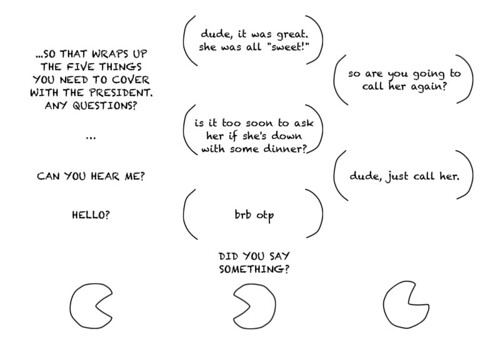In my last two posts, I introduced an idea that our reliance on text alone as a primary channel for communication is changing us. I also described one aspect of this communication, latency, that can help or hinder text communication. In this post, I’m going to talk about agency.
a•gen•cy - noun the capacity for human beings tomake choices and to impose those choices on the world
In the past two days since writing about text, there have been some great comments and sidebar conversations (ironically, all text-based over various social networks). Andrew Krzmarzick, Community Manager for GovLoop commented:
“Unless I know someone is calling me at a particular time, I really try hard to be present with the person in front of me…and I’d appreciate that kind of undivided attention from others. And I think we should be teaching our kids something about that as a core value…”
Andrew isn’t alone, as you can read in those comments. I think when most people pull out a device in the middle of a face-to-face discussion, they are largely ignorant of the implications of their actions. At the very least, that is how I try to approach it. When I’m on the phone with someone and there is too much latency, my mind fills in the blanks if my conversant is actually invested in our conversation.
The person texting in the middle of your conversation is providing their correspondent more of their attention. It is rude, but our reliance on text presents different expectations for immediate responses — one of the side-effects I alluded to in my previous post. Other experiences have to reinforce priorities which leads me to think that we spend a lot less time figuring out priorities than we do communicating.
As a result of starting to blog about text, I was forwarded an article that talks about how college students have a hard time withdrawing from their networks. As one student in the article noted, “It’s frustrating when you put a lot of work into a class presentation, and you know your classmates are looking at their e-mails.”
Me? I get twitchy when I leave a message, email or text and it goes too long without a response. I can only imagine what a customer or a manager feels like in an “always-on” world. I wonder if my priorities are among someone else’s priorities, or if (without their attention) I’m just a ghost.
In any kind of communication, agency is about your potential to make an impact. That requires a situation where you can hold people’s attention and interest. When so many people are conditioned for text over face-to-face interactions, holding attention and interest is tricky. Part of your shared experience can be framed by setting expectations appropriate to the shared context. You can also shape the experience by dealing with the distractions in the environment that trigger unwanted but hard-wired behaviors. In my next posts, I’ll talk to expectations that I set that can actually be met and ways to frame interactions to work with different communication needs.
Related posts:







Leave a Reply
You must be logged in to post a comment.